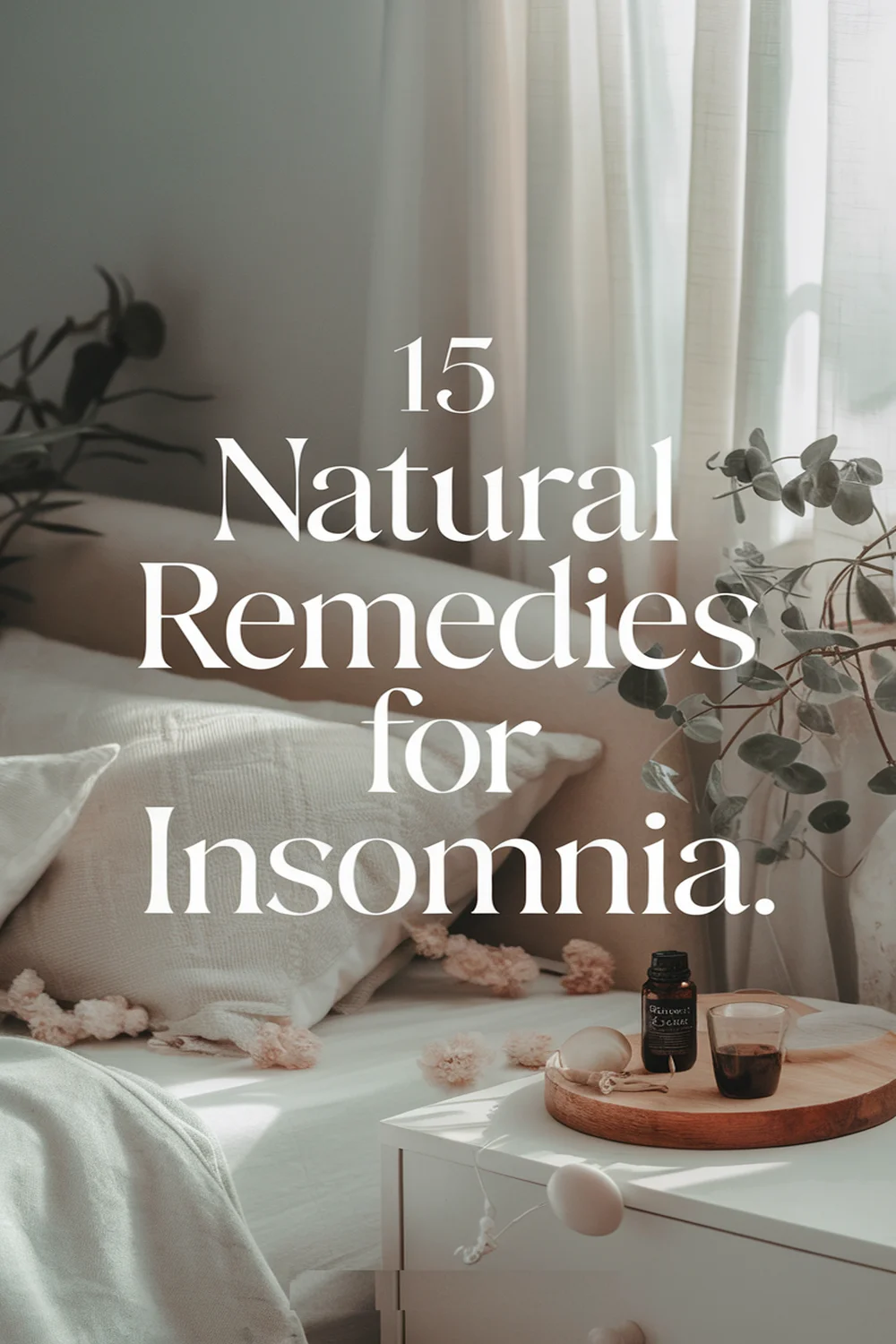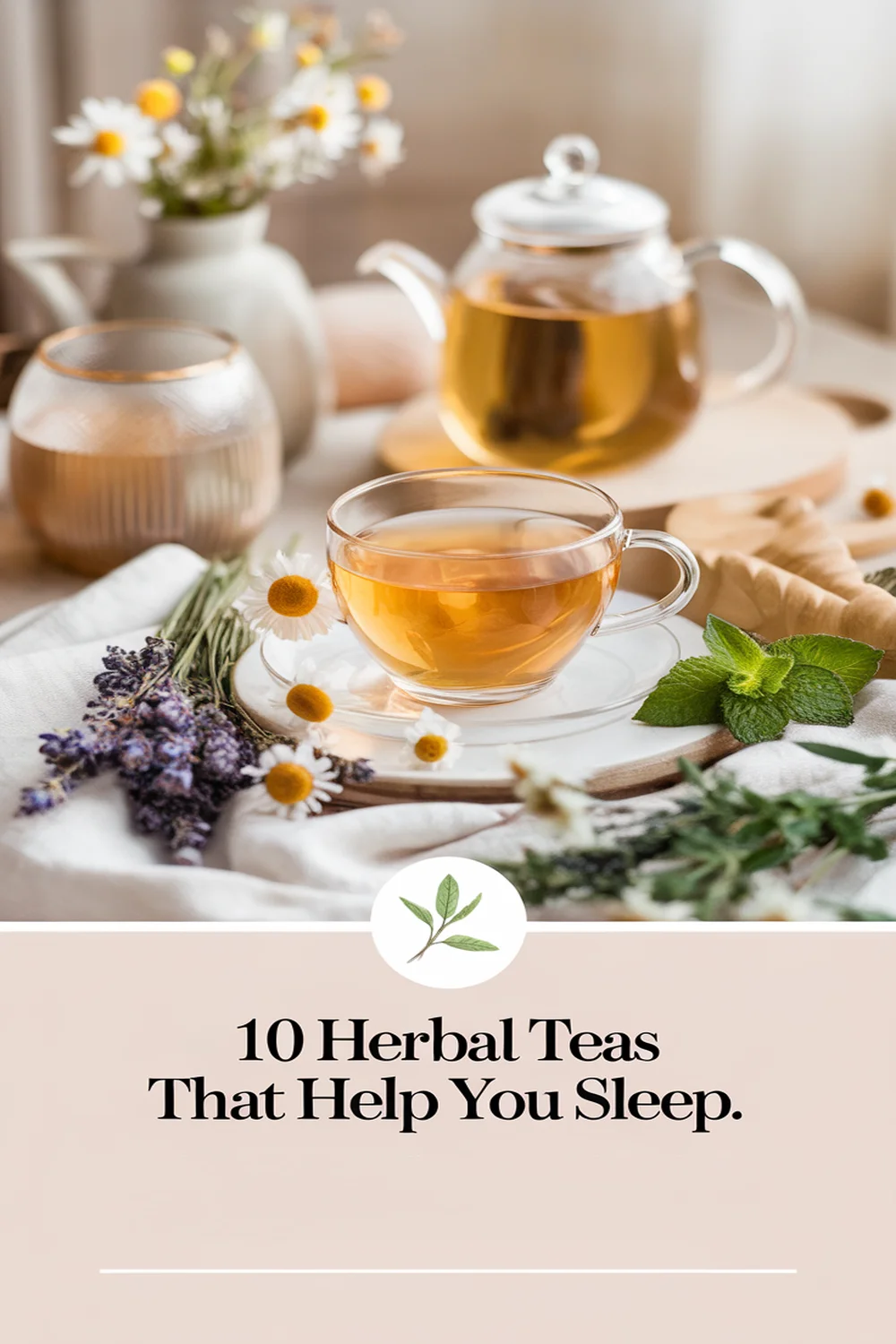To combat insomnia, consider incorporating herbal teas like chamomile and valerian root for relaxation and calming effects. Melatonin supplements can help regulate your sleep-wake cycle, while magnesium-rich foods promote muscle relaxation. Creating a soothing environment with white noise and reducing screen time can also improve sleep quality. Don’t forget the power of aromatherapy with essential oils. If you’re curious about more remedies, explore additional methods and tips to enhance your nighttime routine and sleep quality.
Herbal Teas to Soothe Your Mind
If you’ve ever found yourself tossing and turning at night, sipping on a warm cup of herbal tea might be just the remedy you need. Studies show that certain herbal teas can considerably improve sleep quality. Chamomile tea, for example, contains apigenin, which binds to receptors in your brain that promote relaxation. Lavender tea is another excellent choice; its soothing aroma can help reduce anxiety and improve sleep onset. Valerian root tea has long been used for its sedative effects, making it a powerful option for those battling insomnia. By incorporating these herbal teas into your nightly routine, you not only enjoy their comforting warmth but also harness their natural properties to enhance your overall relaxation and prepare your mind for rest.
Recommended Items
Discover our top picks for enhancing your sleep naturally—explore our recommendations!
Aromatherapy for Relaxation
Aromatherapy can be a powerful ally in your quest for relaxation, especially when you’re struggling to unwind after a long day. Essential oils like lavender, chamomile, and bergamot have been shown to reduce anxiety and promote feelings of calm. Simply inhaling these scents can activate brain areas linked to emotional regulation, helping you to feel more at ease. You can use a diffuser to disperse these oils into the air or add a few drops to your bath for a soothing experience. Even a simple massage with aromatic oils can enhance relaxation by easing muscle tension. Incorporating aromatherapy into your nightly routine may help you shift into a state of serenity, paving the way for a restful night’s sleep.
The Power of Melatonin
While many factors can disrupt your sleep, melatonin stands out as a natural hormone that plays an essential role in regulating your sleep-wake cycle. It’s produced by your pineal gland in response to darkness and can help signal your body that it’s time to sleep. If you’re struggling with insomnia, consider these three aspects of melatonin:
- Supplementation: Taking melatonin supplements can safely enhance your natural levels, especially for jet lag or shift work.
- Timing: Ideally, you should take melatonin about 30-60 minutes before bedtime for best results.
- Light Exposure: Limit exposure to blue light from screens in the evening to support your body’s melatonin production.
Harnessing melatonin’s power might just be the key to a restful night.
Magnesium’s Role in Sleep
As you seek solutions for insomnia, don’t overlook magnesium, an essential mineral that greatly influences sleep quality. Studies show that magnesium helps regulate neurotransmitters and hormones like melatonin, promoting relaxation and deeper sleep. It acts as a natural muscle relaxant, aiding in the reduction of tension and anxiety, two common culprits of sleepless nights. If your magnesium levels are low, you might experience restlessness or difficulty in falling asleep. Including magnesium-rich foods in your diet, such as nuts, seeds, leafy greens, and whole grains, can boost your levels. Additionally, considering magnesium supplements could be beneficial, but always consult with a healthcare provider beforehand. By focusing on magnesium, you might reveal the restful sleep you’ve been craving.
Valerian Root as a Sleep Aid
If you’re searching for natural sleep aids, valerian root might be what you need to combat insomnia. This herb has been used for centuries due to its calming properties. Research suggests that valerian may help reduce the time it takes to fall asleep and improve sleep quality. Here are three key benefits to evaluate:
- Reduces Anxiety: Valerian root can help calm your mind, which is essential for a restful night.
- Promotes Relaxation: Its compounds may increase levels of GABA, a neurotransmitter that helps you unwind.
- Improves Sleep Quality: Many users report waking up feeling more refreshed after using valerian root.
Before trying valerian, consult with a healthcare provider, especially if you take other medications.
Action Steps for 15 Natural Remedies for Insomnia
Chamomile’s Calming Effects
After exploring valerian root as a natural sleep aid, it’s worth considering another potent herb: chamomile. This ancient remedy has gained recognition for its calming effects, particularly due to its active compound, apigenin. When you sip chamomile tea, apigenin binds to benzodiazepine receptors in your brain, helping to reduce anxiety and promote sleepiness. Studies suggest that regular chamomile consumption can improve sleep quality, making it easier to fall asleep and stay asleep. Plus, its gentle, soothing aroma can enhance relaxation rituals. To harness chamomile’s benefits, enjoy a warm cup before bedtime, allowing the herb’s natural properties to work their magic. Incorporating chamomile into your nightly routine could become your new favorite sleep strategy.
Creating a Sleep-Inducing Environment
To optimize your chances of a restful night’s sleep, it is essential to create a sleep-inducing environment. Research shows that your environment greatly affects sleep quality. Here are three key aspects to take into account:
- Lighting: Dim the lights as bedtime approaches. Use blackout curtains to block out any external light that might disturb your sleep cycle.
- Temperature: Keep your bedroom cool, ideally around 60-67°F (15-19°C). This temperature range helps facilitate the body’s natural cooling process during sleep.
- Noise: Minimize disruptive sounds. Consider earplugs or white noise machines to create a consistent sound environment that masks sudden noises.
Gentle Yoga and Stretching
As you wind down for the evening, incorporating gentle yoga and stretching can greatly improve your sleep quality. Research shows that practicing yoga before bed helps relax your mind and body, reducing anxiety and stress levels. Poses like Child’s Pose and Seated Forward Bend encourage deep breathing and stimulate the parasympathetic nervous system, promoting a restful state. Stretching effectively releases muscle tension, preparing your body for sleep. A consistent routine can signal your brain that it’s time to unwind, enhancing your overall sleep hygiene. Aim for a 15- to 30-minute session, emphasizing slow, deliberate movements and calming breaths. This simple practice can transform your nighttime routine, allowing you to drift off more easily and enjoy deeper, more restorative sleep.
Mindfulness and Meditation Techniques
While you may often struggle to quiet your mind at the end of the day, practicing mindfulness and meditation techniques can greatly enhance your ability to fall asleep. These techniques help you focus your thoughts, and create a calming environment for sleep. Here are three effective methods to try:
- Breath Awareness: Concentrate on your breath. Inhale deeply through your nose, then exhale slowly. This not only calms your mind but also relaxes your body.
- Body Scan: Mentally scan your body from head to toe, noticing any tension. As you focus, consciously relax each muscle group.
- Guided Visualization: Picture a serene scene, like a beach or forest. Engaging your imagination can distract you from racing thoughts and promote relaxation.
Incorporating these practices into your nightly routine can help you achieve more restful sleep.
The Benefits of a Sleep Routine
Establishing a consistent sleep routine can markedly improve your overall sleep quality. When you go to bed and wake up at the same times each day, your body begins to regulate its internal clock, promoting a smoother shift into sleep. Research shows that this consistency enhances melatonin production, making it easier to fall asleep and stay asleep. You’re also likely to experience deeper, more restorative sleep, reducing daytime fatigue and boosting cognitive function. Furthermore, a routine helps signal to your brain that it’s time to wind down, making relaxation easier. By prioritizing this habit, you’re setting yourself up for improved mood, energy levels, and overall health. Cultivating a sleep routine truly is a simple yet effective remedy for insomnia.
Warm Milk and Its Sleep Properties
If you’re seeking a natural remedy for insomnia, warm milk might be just what you need. This comforting beverage has been linked to better sleep due to its unique properties. Here are three reasons why warm milk can help you drift off:
- Tryptophan Content: Milk contains tryptophan, an amino acid that boosts serotonin and melatonin production, hormones essential for regulating sleep.
- Calcium: The calcium in milk aids in the brain’s utilization of tryptophan, enhancing its sleep-promoting effects.
- Comfort and Routine: The act of sipping warm milk can create a calming bedtime ritual, signaling your body it’s time to unwind and prepare for rest.
Incorporating warm milk into your evening routine could be the simple solution you need for a better night’s sleep.
Using White Noise for Better Sleep
Many people struggle with falling asleep due to noise distractions, but using white noise can be a game changer for better sleep. White noise creates a consistent sound environment, effectively masking disruptive noises like traffic or loud neighbors. Studies show that sleeping with white noise can enhance sleep quality, helping you fall asleep faster and stay asleep longer. It works by providing a soothing background sound that promotes relaxation and signals your brain that it’s time to rest. You can use a white noise machine, smartphone app, or even a fan to achieve this effect. Experiment to find the right sound level; too loud might be distracting, while just right can transform your sleep experience and improve overall well-being.
Dietary Changes for Insomnia Relief
Quality sleep is influenced not just by environmental factors like noise but also by what you eat and drink. Making some dietary changes can greatly improve your sleep quality. Here are three adjustments to reflect upon:
- Limit Caffeine Intake: Cutting back on caffeine, especially in the afternoon and evening, can help you fall asleep faster.
- Incorporate Sleep-Promoting Foods: Foods rich in magnesium, like spinach and bananas, can relax your muscles and make it easier to sleep.
- Avoid Heavy Meals Before Bed: Eating large meals can lead to discomfort and disrupt your sleep cycle, so opt for lighter snacks instead.
The Impact of Screen Time
As you unwind at the end of your day, your screens might be doing more harm than good when it comes to sleep. The blue light emitted by phones, tablets, and TVs can interfere with your body’s production of melatonin, the hormone responsible for regulating sleep. Studies show that excessive screen time, particularly before bedtime, can delay your natural sleep cycle. It’s easy to lose track of time while scrolling through social media or binge-watching shows, but these habits can lead to insomnia and poorer sleep quality. To improve your sleep, consider setting a digital curfew. Aim to power down your devices at least an hour before bedtime, allowing your mind and body to relax and prepare for a restful night’s sleep.
Natural Supplements for Sleep Support
Consider integrating natural supplements into your nighttime routine to enhance sleep quality and combat insomnia. Many people find that specific supplements can promote relaxation and sleepiness, making it easier to drift off. Here are three options worth exploring:
- Melatonin: This hormone regulates your sleep-wake cycle. Taking melatonin can help you fall asleep faster, especially if you have a disrupted schedule.
- Valerian Root: Known for its calming properties, valerian root may reduce the time it takes to fall asleep and improve sleep quality.
- Magnesium: This essential mineral plays an important role in sleep regulation. Supplementing with magnesium may help relax muscles and reduce anxiety, facilitating better sleep.
Always consult with a healthcare provider before starting new supplements to make sure they’re safe for you!











